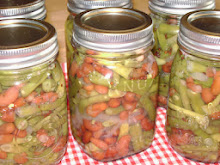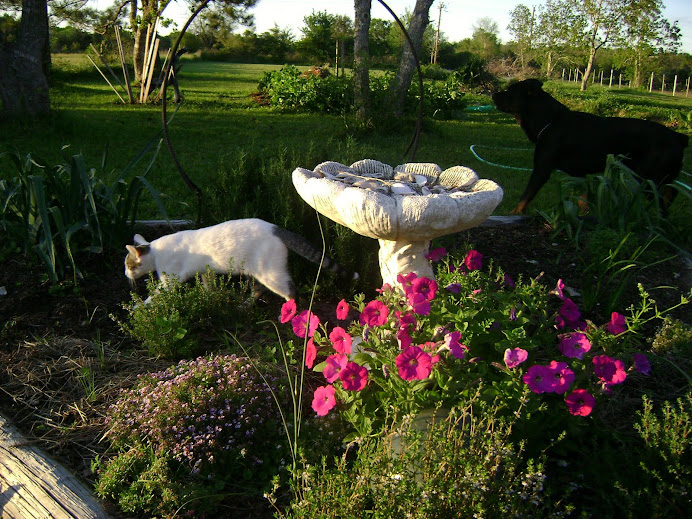Since every different region of the country will have its own set of specific problems to address, there are some things that work in any garden in any zone. I grow in zone 8b on the Gulf Coast of the Southeast Texas region. Some things I describe may not be a situation for Northern Gardens, but the companions will be the same.
The best place in the garden that I have found for growing berries is directly in the herb garden. Berries surrounded by native Wildflowers, herbs and a few other essential garden aids will have everything beneficial that nature can provide.
1. Thyme, a remarkable herb that has a wonderful relationship with berries. I have noticed that when thyme is growing near it seems to stretch itself towards the berry plants as though to embrace and protect it. In the south we have a tendency to have pill bugs or sow bugs that enjoy eating holes in the fruit, but where the thyme grows there is none to be found.
2. Borage, another wonderfully flavored herb with a light flavor of sweet cucumbers will attract more honeybees than you could hope for when it is in bloom. The tiny and delicate periwinkle blue flowers are hosts to many pollinators. One year I grew it directly in the strawberry beds but found that in my garden area the borage gets huge and blocks sunlight for the berries to produce and ripen. So now kept on the outer borders of the herb garden it serves its purpose perfectly. Since borage enjoys cool climates it is one of our popular spring herbs to enjoy and readily reseeds itself every season. It has been long said that borage will help your strawberries in becoming more disease resistant.
3. Sage always grows in the herb garden and when mature it produces the most gorgeous short purple spikes. Sage is another defender, aiding in warding off harmful pest.
4. Heirloom Marigolds should embrace your strawberry beds and placed throughout the herb garden. The old fashion varieties of heirlooms, like the French Sparky and Jester has a much stronger scent than hybrids, thus repelling harmful insects more efficiently. Actually the herb Mexican Mint Marigold is beneficial as well for warding off many harmful pests. I always recommend that when initially planning the placement of new strawberry plants to try and grow marigolds in those areas the year before. Marigolds will eliminate harmful nematodes from your soil that might infest the roots of your strawberry plants. They are an excellent choice to add to the garden every year for a whole host of benefits.
5. Onions are planted throughout the strawberry beds in the early months of winter in our area. I usually plant mine right after the New Year and they are harvested near Easter time. Onions ward off many harmful insects that might want to migrate to my strawberry patch. The bad bugs have very little opportunity of being successful with all of the defending companions planted throughout the herb garden.
6. Bush Beans are another favorite companion to the strawberry patch. I usually reserve growing beans until the end of June when the strawberries have finished producing in our area. The beans will shade the strawberry plants in the hottest parts of the summer, keeping the soil cool for plants to survive the brutal triple digit temperatures. The beans also add a whole lot of nitrogen back into the soil keeping the berry plants healthy and nourished.
7. Lettuce and Spinach also enjoy the company of strawberry plants. These can be grown in the earl y spring months and again in the fall in my region. There is also a special summer spinach that grows well in the hot months called New Zealand that will also act as a ground cover to keep the soil cool.
Bad additions to your strawberry patch would be things from the cabbage family like broccoli and Brussels sprouts for example. Also be very sure to never ever plant new strawberry plants where Tomatoes, Peppers, Eggplants and Potatoes have grown the previous season. This would increase the chances of your berries catching the virus Verticillium Rot.
Happy Gardening!
Pammy






















.jpg)


















No comments:
Post a Comment